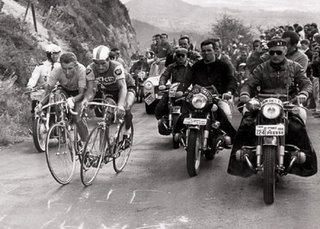
Dope, dope, dope. Paul Stump argues that it all began with the Tour de France, because such a mad idea meant it had to
"All France holds its breath". It is July 13, 1964. Chunky Limousin Raymond Poulidor (right) and Jacques Anquetil are coude-a-coude up the corkscrew cul-de-sac of the Puy De Dome, the basalt volcano in the Massif Central. Julio Jimenez, the flyweight Spanish climber, has long since danced on his pedals and soared into an unassailable lead; but people's almost-champion Pou-Pou and Parisian chou Anquetil are renewing a years-old duel in what was the first great sporting moment on French TV. Poulidor burnt Maitre Jacques off; but the Norman won the Tour.
Two years later Anquetil would win the gruelling week-long Dauphine Libere stage race in the baking mountains of Rhone-Alpes and, the next day, win the 550km Bordeaux-Paris race. In betweentimes, he would lead riders' strikes against dope testing and declare to journalists; 'you don't win the Tour on mineral water'. A year later still, Tom Simpson would ride himself to death on the calcite griddle of Mont Ventoux's merciless white slopes in 120 degree heat, his metabolic capabilities haywired by the drugs he had taken (speed, speed).
Let us review the facts; from Rennes anticlockwise to Paris, the 1964 Tour covered 4505km in 22 days, as opposed to the 3200 common today. 1964 was the first time the Tour went over the Col de Restefond, a 2802m-high pass, where snow was banked six feet high even under a Midi midday sun and where even hikers might stop to suck an oxygen tit.
This, of course, was as naught compared to the 5745km of 1926(chapeau, Lucien Buysse!), when repairs were the rider's responsibility, derailleur gears were banned, when bears and bandits roamed the Pyrenean cols, when day stages started at 3 am to cover distances of 450km-plus (Metz to Dunkerque over cobbled bleared with soot and rain was a particular brute).
Henri Desgranges, the Tour's founder, launched it - and maintained it till 1939 - in the spirit of fin-de-siecle Nietzscheanism. Altius, fortius indeed; the purer, the stronger, the greater, will prevail. This principle, which arguably underpins all organised sport, was the lynchpin of Desgranges' thinking, to the power of ten. Not for nothing did he take the Tour over the mountain passes where he imagined Zarathustra mused during the Nachtlied.
Octave Lapize didn't see it that way in 1910 - as he hyperventilated his way up the horribly steep Aubisque in the Pyrenees, en route to final, spent victory in Paris, he hissed at Desgranges' officials as they clustered at the summit; 'vous etes des assassins' - you murdering bastards. Desgranges was unruffled. Next year, the Col de Galibier, in the Grandes Alpes, at 2645m, was introduced to the peloton. It remains the Tour's highest regular calling point; only Iseran (2770m) and Restefond are closer to heaven. 'O Tourmalet, O Sappey, O Bayard [and other mountains]' he wrote, 'I will not shirk from my duty in proclaiming that beside the Galibier you are but pale and vulgar babies'. But nonetheless, next year, up they went. That's sport. That's sportsmen.
After the hysterical insanity of Desgranges' Tour concept, cycle racing could never be the same again. And neither could the riders. Imagine asking Isinbayeva to pole-vault 30 feet; imagine asking Woods to play Troon with a stick of rhubarb; imagine asking Radcliffe to break two hours. All equate to what Desgranges' megalomania demanded of his riders.
Desgranges and his Tour not only redefined the paradigms of cycling, he also came damn close to redefining paradigms of sport. Lapize was right; Desgranges and his men were murderers, insofar as they induced men to become something they were not. Not corpses, but differently-configured beings. The only means of such transmorphism was, of course, chemical.
No comments:
Post a Comment